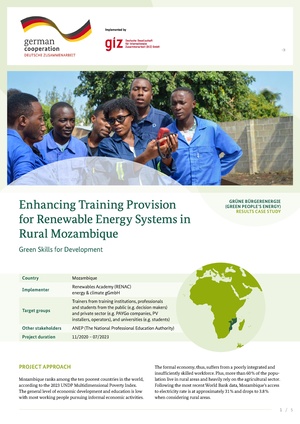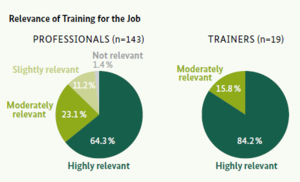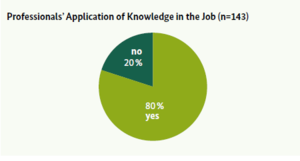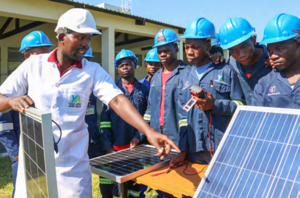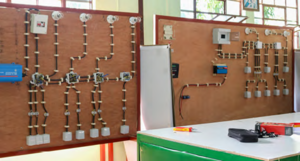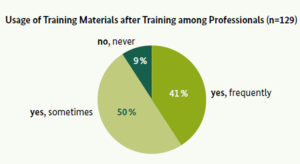Enhancing Training Provision for Renewable Energy Systems in Rural Mozambique
Enhancing Training Provision for Renewable Energy Systems in Rural Mozambique
Project Approach
Mozambique ranks among the ten poorest countries in the world, according to the 2023 UNDP Multidimensional Poverty Index. The general level of economic development and education is low with most working people pursuing informal economic activities. The formal economy, thus, suffers from a poorly integrated and insufficiently skilled workforce. Plus, more than 60 % of the population live in rural areas and heavily rely on the agricultural sector. Following the most recent World Bank data, Mozambique’s access to electricity rate is at approximately 31 % and drops to 3.8 % when considering rural areas.Mozambique has a high and unexploited solar radiation potential. The nation’s solar irradiation yields between 1,785 to 2,206 kWh/m2/year, with a potential of 23,000 GW for the supply of people with solar energy. Given the dispersed population in rural areas, offering electricity access through off-grid solar home systems and mini-grids to remote communities may prove more efficient and cost-effective than extending on-grid electrification.
Green People’s Energy (Grüne Bürgerenergie, GBE) follows the objective to improve the conditions for supplying regions in rural Africa with decentralised renewable energy (DRE). GreenSkills4Dev, one of GBE’s interventions in Mozambique, specifically aims at improving the market development of green energy technologies and their related benefits through capacity-building activities.
A crucial aspect of the project is to enhance and widen the training provided in the field of DRE systems and supplies, especially off-grid photovoltaics (PV). The Renewables Academy (RENAC) provides a selection of tailored online and live virtual courses via a digital learning platform specific to the needs of the different stakeholders: private sector, the university and TVET training centers throughout the country. The focus is on the theoretical and practical knowledge transfer on various renewable energy (RE) technologies, especially small scale PV, and cross-cutting topics. Support and training of professionals in business models and skills within the RE value chains is another focus area (e.g. through workshops like “Solar Water Pumping” and “RE Powering Agriculture”). Furthermore, the project supports the Eduardo Mondlane University (UEM) in Maputo to turn the 2 RE curricula into blended learning Masters degrees. It facilitates the improvement of vocational training structures and capacities of local stakeholders to run and expand renewable energy training facilities – e.g. through the development of curricula and training materials, training of trainers, and the procurement of off-grid PV training equipment. Ultimately, RENAC supports the training centers by mentoring the preparation phase and/or implementing the first courses, including continuous didatical trainer assessment.
Methodology of Data Collection
Data for this case study report was collected through a review of project documents, five qualitative interviews with representatives of GIZ, RENAC, and three representatives of training institutions, as well as two quantitative surveys among 375 professionals (from academia, NGOs, as well as the public and private sector) and 34 trainers from training institutions. 143 professionals, of whom 18 % were women, and 19 trainers (5 % women) took part in the surveys. The case study was conducted between March and September 2023.
Key Findings
Project Achievements
The project successfully achieved its targets. The courses for photovoltaic trainers (vocational certificate 2 (CV2) level) and the courses/workshops for solar companies were developed, and two curricula for UEM master students were adapted to a blendedlearning format. A total of 34 trainers (15 % women) received comprehensive training, along with 375 individuals from various sectors. Detailed in figure 1 below, virtually all trainers and professionals underscore the relevance of the provided trainings for their jobs, with 84 % teachers and 64 % professionals considering them even highly relevant. Consequently, 80 % of the professionals apply the newly acquired technical knowledge in their job (see figure 2). The professionals work for a variety of employers, such as solar and PayGo companies, banks, NGOs, or public institutions. When asked about application examples, some training participants provided specific illustrations. Two professionals stated that the training “helped us to plan the pumping system project in Nhamatanda” and another one explained that he now better comprehends the “relevance of photovoltaic technologies for rural communities” in his work.The training helped not only to impart new technical, and for the teachers also didactical, content, but also to deepen existing knowledge and how to apply it correctly in day-to-day work. For example, the participants learned about energy consumption calculation, new pumping technologies, and in-depth solar system sizing. The online PV courses for the private sector and the virtual workshops for decision makers also served to establish connections between the participants and to exchange knowledge. The networking character of the events was highly appreciated by the participants.
Based on a capacity needs assessment, 14 technical training institutions were provided with high-quality laboratory equipment and tools for the implementation of a practical photovoltaic course, and didactical training to further enhance their capabilities to offer hands-on trainings in renewable energy. The training equipment includes solar modules, rechargeable batteries, multimeters, lamps, inverters, charge controllers, infrared thermometer, consumables like wires, etc..
Intermediate Impact
GreenSkills4Dev has led to various positive effects, both at individual and organisational level. At the individual level, the training contributed to income increases for 51 % of the professionals, which can largely be explained by new jobs in the same or another organisation/company (see figure 3). A vast majority of 82 % of the professionals reported that their professional performance has improved as a consequence of the trainings and 45 % have acquired new tasks in their jobs. This leads to direct benefits for the respective employers. One participant pointed out that he could now “participate in exhibitions of mobile photovoltaic systems for charging cell phones in some schools, hotels, markets and shops”, contributing to increasing productivity of the company. Participants also reported improved off-grid business development expertise, enhancing capacities to develop DRE projects and thus to improve energy access in rural areas.The trainers, in turn, report positive impacts of the trainings in terms of improved teaching approaches and the introduction of new practices, as mounting, wiring and measuring the power of PV panels. They impart their knowledge in the classrooms and pass it on to other teachers who did not attend the teacher trainings. On an organisational level and as a consequence of the trainings, some of the training centers have introduced photovoltaic vocational courses in their educational offers. The training and equipment provided have significantly enhanced the quality of learning at the technical training schools. Trainees are now able to gain hands-on experience by working with equipment such as modules, batteries, and other tools instead of learning only theoretically. An interviewee emphasised this point, stating that teachers “can now teach with the real equipment, and not just by showing pictures of the components.”
RE is traditionally considered to be dominated by men in Sub- Saharan Africa and, as expected, participation of women in the trainings was rather low (see above). However, limited positive impacts could be observed. An interviewee stated, for example, that “the person in charge of the renewables project at our [training] center is a woman, and when the female trainees see a woman leader they are inspired to follow the photovoltaics course. And right now, as we speak, there’s a woman on the roof doing the [PV] installation.” Another interviewee confirmed: “a seed has been sown and there are now several women taking the photovoltaics course.”
Challenges in Project Implementation
Procurement of equipment posed an obstacle during project implementation. The equipment of the training centres and the follow-up activities (e.g. inspection and mentoring) were dependent on the outcome of the related tender process. Due to incomplete bids, this process took longer than planned. This bottleneck was further exacerbated by the tense global goods and logistics situation as well as a sharp increase in demand for photovoltaics, leading to further delays in delivery during and after the COVID-19 pandemic.Due to COVID-19 and travel bans, a number of trainings were switched from face-to-face to online formats. It posed a slight challenge that many PV TVET trainers were unfamiliar with online trainings and others had no access to reliable internet, as they live in rural areas throughout the country. The pandemic also posed challenges in terms of communication: steering the project from outside the country forced communication to be mainly online, while processes in public educational institutions can take time. These challenges should be taken into account while implementing a training and equipment project.
A further challenge was the mobilisation of women to take part in trainings, even though women’s participation was emphasised when promoting the trainings. This may reflect the fact that the sector is still largely dominated by men. Hence, there are more men than women RE trainers and in some cases, the project experienced that women trainers tend to have a positive effect on the participation of women. Additionally, some women participants in the training felt societal norms pressuring them at the beginning. An interviewee confirmed this perception by stating: “I felt that society had a difficulty to accept me because I was a women. And also on my own part in not believing that I could do it.”
Lessons Learned
In the run-up to the in-person training of trainers (ToT), it proved to be very beneficial to prepare the participating trainers with a pre-online-training. In order to inform all participants about current innovations and to create a uniform basis to build on during the ToT, two online courses on PV Application and PV Technology had to be attended as preparation. Furthermore, the online courses allowed to early identify knowledge gaps and to discuss them during the virtual classes.Rather than exclusively accrediting the developed training modules with the Mozambican regulatory authority ANEP and introducing them as a new curriculum, the training modules were adapted to the contents of the existing curriculum „Certificado Vocacional de Nível 2 em Electricidade Fotovoltaica (CV2)“ (vocational certificate Level 2 in photovoltaic electricity). In view of the existing Mozambican regulations for vocational education and training and the at times lengthy certification procedures, this appeared to be a sensible approach, as the training providers are for the most part already familiar with this system and the entry of grades or achievements is carried out nationwide via the ANEP portal.
A key learning for online courses is to supplement them with interactive features to improve the learning experience for the participants. The theoretical online course (e.g. PV Technology) was complemented by a practical virtual classroom with simultaneous translation, where participants could also ask and receive answers to work-related questions from their day-to-day operations.
Sustainability of the Intervention
The project measures have a long-term impact on the educational partner institutions because they have integrated the developed courses and training materials into their training offers. UEM now regularly offers the two adapted blended-learning master programmes and the supported training centers have been enabled to provide level CV2 photovoltaic courses also after the end of the project.The results of the survey indicate that a significant portion of the professionals use the skills delivered and provided training materials months after the training, with 41 % reporting frequent usage of the training materials and 50 % of the respondents stating occasional usage (see figure 4). All trained trainers received the training materials and most of the trainers use them as a basis for reference when teaching the courses in their classrooms. These findings suggest that the training materials are generally well-received and have a lasting impact.GreenSkills4Dev set up a network among the 14 beneficiary training centers, providing a collaboration platform for directors and trainers of the centers. To this end a survey was conducted among trainers to assess the interest of the trainers to continue to be an active part of the network. The most prominent benefits identified among the trainers are: to exchange knowledge and experience, to expand the network of contacts in the training field, to gain access to different training approaches and to learn about professional development opportunities. Thus, the institutionalised network shall facilitate knowledge exchange and continuous learning among the members in the long term.
Conclusion and Outlook
GreenSkills4Dev successfully supported the market development of green energy technologies and their related benefits in Mozambique through capacity-building activities for key stakeholders. Both in quantity and quality, the project promoted increased vocational and higher education offers on DRE systems with a focus on off-grid PV. It thereby addressed the challenges of low rural electrification rates and a low skilled workforce. The provision of the equipment for the 14 training centers, albeit with some delays, allowed for hands-on exercises and complemented the developed training materials and capacitated trainers, providing holistic support to the targeted institutions.
Several lasting impacts have resulted from the capacity building activities. By training more teachers and professionals, the project is contributing to the improvement of the solar PV sector, especially in the communities close to where the training institutions operate.
One option would be to scale up the project vertically, as the infrastructure is already in place at the partnering training centers. In fact, an interviewee stated that the “aim is to offer courses at´CV5 and CV6 level in the future”, which would permit graduates to enter university with their certification as well as to pursue higher level professions in RE. Another option would be to horizontally scale up the project. That is more training centers could be supported and further trainers and professionals trained based on the developed courses and materials, as the project showcased the effectiveness of both online and in-person training methods. In this regard, it would be conducive to integrate further measures in the project approach that promote the inclusion and empowerment of women. These could include awareness raising and sensitization, advertising targeted to women, and facilitated access to trainings by sponsoring female participants. In sum, through the project design and outcomes described, potential for sustainable impact at a relatively low cost is clearly visible.

